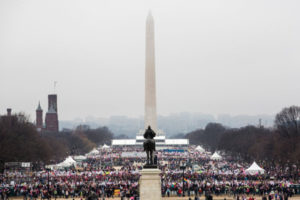Posts Tagged ‘protest’
Power on Loan
The first march I covered as a journalist was a massive anti-war moratorium in Boston in the spring of 1970, part of nationwide protests; Boston was one of the hub cities. The demonstrators walked peacefully from the Boston Commons through the city to Harvard Square in Cambridge. But as the day and evening wore on, the demonstration descended into violence in Cambridge with Molotov cocktails thrown through store windows and police dogs and tear gas aimed at the crowds. I took refuge eventually in the basement of a church where I wrote my story.
America was on the march back then against the Vietnam war and in earlier protests in favor of civil rights. Though there was violence, most of the demonstrations remained nonviolent.
In the intervening years there have been many marches and protests in the U.S., but few like the ones held around the country this past weekend. These nonviolent demonstrations in cities in every state and in 55 cities worldwide focused on a more loosely articulated goal, not on specific legislation or a specific action but on showing solidarity, particularly with issues important to many women like freedom of choice over their bodies and also on issues such as the rights of immigrants, of minority communities, and of the LGBT community.

There was also apprehension about exactly what the new President’s “America First” policy will mean. Demonstrations around the world showed that America’s positions are not just the concern of U.S. citizens but have impact globally.
I’ve covered and seen many demonstrations around the globe since my first march. On Saturday, I was on the edge of the gathering in Washington, witnessing, hosting and delivering one marcher who came in from Colorado to participate. As she joined the crush in the Mall, I wrote and prepared for a PEN mission to Turkey where the political situation is deteriorating daily for citizens, especially those in the media.
In the Turkish Parliament this past week fights broke out as President Recep Erdoğan proposed and got ratified a Constitutional amendment to give even more power to the president, including an article that gives the President the right of “extorting individual rights and freedom” with statutory decree. The Constitutional amendment must be endorsed in a national referendum so demonstrations in Turkey may soon begin but with potentially direr consequences than in the U.S. In Turkey almost 150 writers and journalists are already in prison, not for crimes, but because they have dissented.
A few writers like Asli Erdoğan and linguist Necmiye Alpay have been released at their trial where Asli said, “Law is obliged to protect the individual and the community, not only the state.” The day they were released, however, journalist and writer Professor Istar Gözaydin, one of the founders of Turkey’s first democratic private radio, was taken into custody.
Last week musician Şanar Yurdatapan was sentenced to one year and three months in prison for participating in the “Editor-in-Chief on Duty” solidarity campaign at Özgür Gündem, the newspaper now closed. His sentence was ultimately suspended and another charge relating to the case resulted in a fine. The prosecutor had originally asked for a ten-and-a-half-year sentence. Cumhuriyet’s book editor Turhan Günay, who publishes a book index, is now in prison. He has said, “I have not written anything except for books until today. If I’m released, I will start to write political articles.”
The numbers of writers, journalists, editors and academics in prison has returned Turkey to the top of PEN’s list of jailors as it was two decades ago.
I’m wary about drawing parallels with the increasingly chilly atmosphere for the media in the U.S. I take heart that U.S. protests can occur and that the state protected the protestors, and as long as the demonstrations stay nonviolent, no one is arrested. The press can and does report what it sees even if a tongue-lashing by the Presidential press secretary and the President follow. However, six covering the turbulent demonstrations around Donald Trump’s inauguration on Friday have reportedly been charged with felonies and face up to ten years in prison and a $25,000 fine if convicted. Also some access for the press may be closing down. The dynamics of fear and antagonism and the argument of “alternative facts” create a dangerous atmosphere.
Of note, though not in the front page headlines, in Africa’s smallest continental country, The Gambia, former President Yahya Jammeh finally stepped down from power this week after 23 years, having lost the election last month but refusing to leave office. The peaceful transfer of power in the U.S. the day before probably had little to do with his decision. The arrival of troops from a coalition of West African nations supported by the United Nations and the pressure by African leaders were no doubt the persuading factor, but the coincidence is worth noting.
The turnover of power is fundamental to democracies and is not always easy, especially when the pendulum swings to the opposing side and in the U.S. to someone who has not won the popular vote. Yet after a tumultuous and harsh election, the reins of power did transfer; authority was ceded. The old guard left the stage with dignity, and the new guard must now find the dignity to occupy it effectively.
The demonstrations of four decades ago in the U.S. led to the end of a war, the implementation of civil rights legislation, advancement for race, gender and cultures, and while we still have distance to go, it has led to large strides for women in my generation.
I continue to hope the arc of history is upwards and outwards, not inwards on itself, puncturing the very progress that has been made. Whoever is in power must remember that power is only on loan, especially in a democracy.